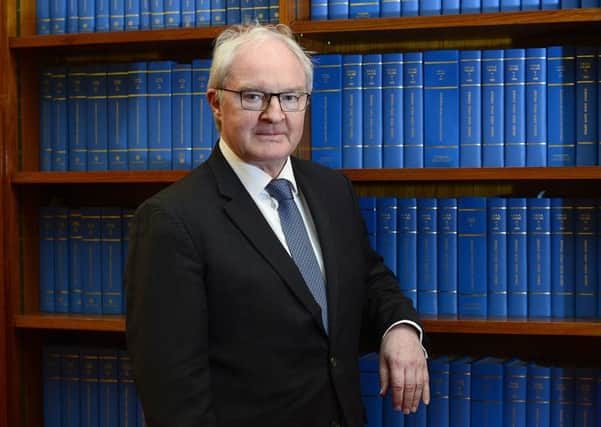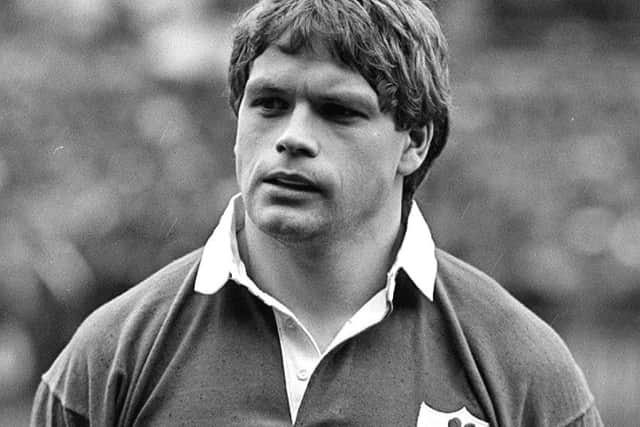Declan Morgan interview: ‘I recognise many people see legacy process as unfair but no-one has come to me with a plan for unsolved murders’


In March the lawyer, politician, reconciliation activist and ex Ireland rugby international Trevor Ringland wrote to this newspaper.
He mentioned a letter he had written the month before, asking the whereabouts of any plan was to investigate 700 unsolved Troubles murders of security forces.
Advertisement
Hide AdAdvertisement
Hide AdMr Ringland is one of a number of prominent people who were becoming increasingly outspoken, via this newspaper, about their belief that the past was being investigated in an unbalanced way against state forces, and that people in positions of authority, including government ministers and much of the media, were neglecting those concerns.


In 2017, Mr Ringland had written on these pages that the Lord Chief Justice of Northern Ireland, Sir Declan Morgan, the Police Ombudsman, Michael Maguire, and the then Director of Public Prosecutions, Barra McGrory, and others, “are in a position to be open with the public that at best, only partial truth recovery is possible”.
But in his March 2019 letter (Lord Chief Justice must set out plan to deal with unsolved terrorist murders, March 10, see link below), Mr Ringland was his most outspoken on the topic, amidst a backdrop in which a political party, Sinn Fein, that was once assumed to be inextricably linked with the IRA, had repeatedly cited Sir Declan’s calls for inquest funding, in order to justify the party’s own demands on legacy.
In the first part of this interview, which was published on Saturday and is on our website, link below, Sir Declan explains that he was put in charge of coroners in 2015 and so he sought the capacity to be able to carry out that legal responsibility.
Advertisement
Hide AdAdvertisement
Hide AdHe also makes clear that he cannot control how political parties might use his comments for their own aims.
In this second part of the interview, we ask Sir Declan about Mr Ringland’s comments, because they reflect wider concerns that surfaced in our Stop The Legacy Scandal series of essays (see link to the essays below).
The ex sportsman had not in his letter explicitly referred to Sir Declan’s calls for an inquest funding, but he had clearly parrotted the request over legacy inquests, many of which are into killings by security forces and scores of the dead of which were terrorists.
Mr Ringland wrote: “There are over 700 unsolved murders of members of the security forces. What is the six year plan, with budget, to deal with those? Most democracies investigate those murders as a priority.”
Advertisement
Hide AdAdvertisement
Hide AdSir Declan says of that letter: “I saw Trevor’s comments. I’ve huge respect for the amount of work that he does in terms of reconciliation.
“There have been individuals and groups who have tried very hard to make a difference in this community. I personally think a lot more could be done to support the work that they do and I certainly would be anxious to try to help that.”
He adds: “But getting back to your specific question about what can I do. Anything I can do, I’m more than happy to do.
“What I have not the background to be able to do, I can’t promise to do, but I certainly think that where Trevor was absolutely right is that we haven’t seen in the discussion about the Stormont House agreement — I haven’t seen anyway — where somebody has sat down as we have done, and said, to do this I need so many investigators, I need resource of whatever kind, it will take me what sort of time in order to be able to do this.”
Advertisement
Hide AdAdvertisement
Hide AdSir Declan understands that the Northern Ireland Office has someone looking at the resource aspect, but adds: “My fear is that some of the Stormont House Agreement issues turn out to be disappointing to victims. Judith Thompson, on behalf of the victims and survivors, I think has signalled that what she wants is likely to be beyond what the government are thinking of.”
The interview turns to another key criticism of the way legacy is being handled in Northern Ireland: that state forces are judged to a sub-criminal standard, of balance of probabilities, where it is easier to find against them, while terrorists have mostly been judged to the higher criminal standard, where it is harder to find against them.
This lower standard of proof applies in the Bloody Sunday inquiry, in legacy inquests, in police ombudsman probes into claims against RUC, and in multiple, legal aid-funded cases against the state taken by republicans.
The lawyer Neil Faris, for example, in our legacy scandal series, raised grave concerns about the prospect of ex RUC officers being damned in reports that prosecutors would not deem acceptable in a criminal court, and the implications for the ‘rule of law’ – a concept Sir Declan often cites.
Advertisement
Hide AdAdvertisement
Hide AdThere have been a small number of cases in which paramilitaries are judged to the civil standard, including the Omagh bomb case Sir Declan was involved in, but nothing like as many as such investigations of the state.
Asked about this point, Sir says: “I obviously recognise that there are many people in this jurisdiction who see this process as imbalanced and unfair and in particular those who have suffered the loss of members of their family, who have had to live with it, who have found that there has been very little apparently done to justify their position.
“They are quite right to feel that they have been let down. I think we have to find a way of respecting those people. I’m not entirely sure what the way is, but I think we have to find a way.”
Sir Declan says it is “part of the reason why I say I don’t think you can just draw a line because those people I think need to have their voice heard as well. I agree with the general proposition that we need to find some way of doing it and set up the legal structures which will enable to do that.”
Advertisement
Hide AdAdvertisement
Hide AdSir Declan is referring to his answer to another of our questions: his thoughts on the view of some observers that it is not possible to resolve the past and better to draw a line.
“That is obviously not a matter for me,” he says, mindful of his earlier insistence that he does not take political positions. “But I am conscious of the fact that, having met some of those who have been involved in the victims and survivors group, and also in the families, that I don’t think that you can just walk away from this.
“I think you have to find a way of dealing with it, but I think that we have been very focused on issues around truth and justice and one of the things that has concerned me about the way in which one looks at the past is that I think you have to see a context here.
“The context is that we’ve got to have our mind at least alert to the fact that the underlying objective is reconciliation. The mechanisms as there are within the present structures it seems to me have not been used for that purpose yet in any meaningful way.”
Advertisement
Hide AdAdvertisement
Hide Ad• Final part of interview on today’s (Tuesday) print edition, and to be put online at a later stage
• For the first part of the interview, ‘Inquiries were not the only way to handle legacy,’ click here and for an accompanying article where Sir Declan Morgan speaks about his early years, ‘Catholics did not so much lack faith in justice as lack engagement’, click here
• Letter, Trevor Ringland, March 2019: Lord Chief Justice must set out plan to deal with unsolved terrorist murders
• Link to the News Letter Stop The Legacy Scandal series of essays